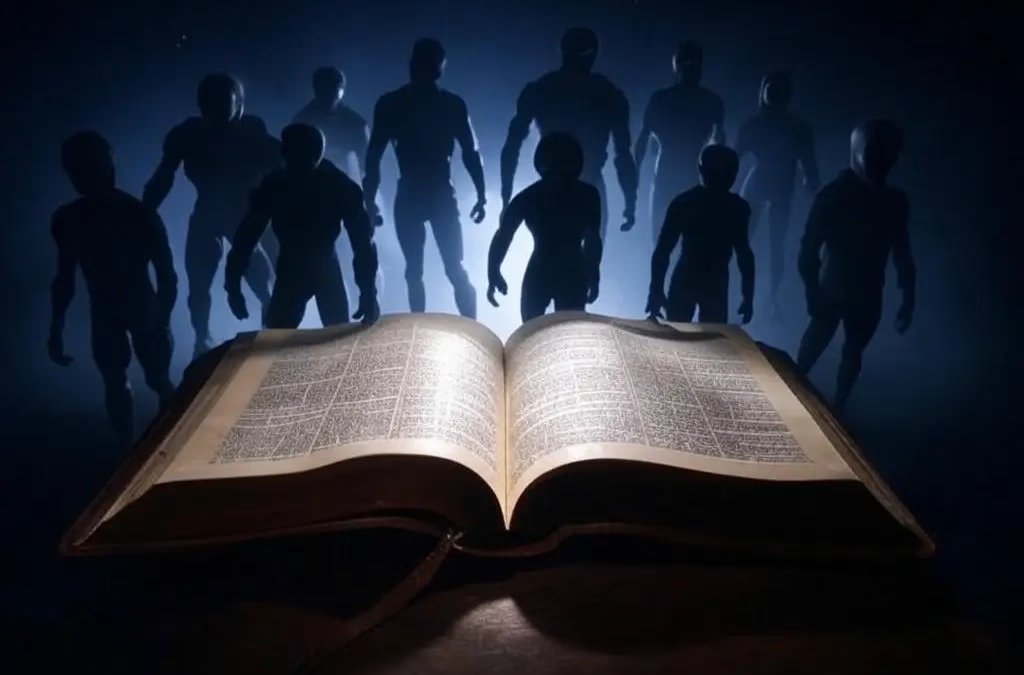In a world buzzing with information, it’s easy to stumble across captivating theories—chemtrails clouding our skies, ancient astronauts shaping human history, moon landing hoaxes, hidden alien secrets, or lost civilizations buried by time. These ideas grip hearts and minds, promising hidden truths that challenge what we’re told. Of all the fringe theories and beliefs, the most pernicious one is related to ancient aliens and other gods. The Bible contains many clear warnings against belief in false gods and false teachings.
Way back in the 1970s I read books like Gods from Outer Space and Chariots of the Gods by Erich von Däniken. I was not a Christian then and it was certainly an interesting construct. Later, Carl Sagan came out with his arguments against this theory. However, that did not stop von Däniken. Many years later it reared its disinformation campaign on the History Channel of all places! That marked the end of history on the History Channel and the beginning of the website Ancient Aliens Debunked.
As Christians, how do we navigate these claims with discernment, holding fast to biblical wisdom? This post explores why conspiracy theories hook us, why they’re defended despite evidence, and how Scripture guides us to seek truth with clarity and humility. Let’s dive in, testing every spirit against the light of God’s Word.
Seeking Order in a Fallen World
The world’s chaos—wars, corruption, disasters—can feel overwhelming. Conspiracy theories like chemtrails or hidden aliens offer a sense of control, suggesting a secret plan behind the mess. But Scripture reminds us that creation groans under sin’s curse (Romans 8:22), and God alone holds the ultimate plan. Clinging to man-made explanations risks trading divine trust for fleeting comfort, as Proverbs 3:5 urges us to lean not on our own understanding but on God’s.
Distrust Rooted in a Sinful Heart
Past betrayals by leaders or institutions fuel skepticism, making theories about moon hoaxes or government cover-ups feel plausible. While discernment is wise, Scripture warns against a heart hardened by cynicism (Ephesians 4:18). The Bereans in Acts 17:11 questioned boldly but tested claims against truth, not emotions. Rejecting all evidence as “corrupt” can blind us to God’s created order, revealed through verifiable facts like lunar rocks or archaeological records.
The Lure of Earthly Excitement
Believing in ancient astronauts or lost civilizations sparks awe, like uncovering a divine secret. Yet Psalm 119:18 calls us to find wonder in God’s law and works, not speculative tales. These theories can become idols, drawing us from the true thrill of knowing Christ, who is “before all things” (Colossians 1:17). Trading biblical truth for sensationalism leaves us chasing shadows instead of the Creator’s light.
Community Over Truth
Conspiracy groups—online or in person—offer belonging, where defending ideas like chemtrails cements bonds. But Hebrews 10:25 calls us to fellowship rooted in Christ’s truth, not shared error. Loyalty to a group over evidence can mirror the crowds who rejected Jesus for Barabbas (Matthew 27:21-22). Godly community uplifts us to test all things (1 Thessalonians 5:21), not to cling to unproven claims.
Deceived by Our Own Minds
Our brains seek patterns, sometimes seeing connections—like contrail conspiracies—that aren’t real. Jeremiah 17:9 warns that the heart is deceitful, prone to misleading us. Confirmation bias, where we cherry-pick evidence to fit beliefs, echoes the Pharisees’ refusal to see Jesus’ miracles (John 12:37). Scripture calls us to renew our minds (Romans 12:2), testing claims against creation’s order.
Skepticism Without Humility
Questioning the world is good—Jesus challenged religious hypocrisy (Matthew 23). But unchecked skepticism, dismissing moon landing telemetry or archaeological findings as fake, becomes prideful rebellion against truth. James 4:6 reminds us God opposes the proud but gives grace to the humble. True discernment weighs evidence prayerfully, trusting God’s sovereignty over what we can’t yet understand.
Anchoring in God’s Truth
These theories persist because they prey on our fears, desires, and fallen nature. But as believers, we’re called to seek truth with a heart surrendered to Christ. Philippians 4:8 urges us to dwell on what is true, noble, and pure. Instead of chasing conspiracies, let’s ask questions grounded in Scripture and evidence—why haven’t we found alien traces? What does archaeology reveal about human history? By testing all things against God’s Word and His creation, we find a truth far greater than any theory.
Obligation to the Truth
As Christians, we are bound by a sacred duty to pursue and uphold truth, for our faith is anchored in Jesus Christ, who declares Himself “the way, the truth, and the life” (John 14:6). This obligation transcends personal opinion or comfort, compelling us to test all claims—whether conspiracy theories or cultural narratives—against the standard of God’s Word and the evidence of His creation (1 Thessalonians 5:21). To embrace falsehood or cling to unproven ideas risks dishonoring the Creator, who designed an orderly universe that reflects His truth (Psalm 19:1). With humility, we must seek truth diligently, knowing that deception can lead us astray from God’s path (Ephesians 4:14).
Intellectual and Spiritual
This pursuit isn’t just intellectual—it’s spiritual. Scripture warns against being swayed by “every wind of doctrine” (Ephesians 4:14) and calls us to speak truth in love (Ephesians 4:15), even when it challenges cherished beliefs or divides us from others. As stewards of God’s truth, we’re to approach questions with discernment, like the Bereans who examined Paul’s teachings against Scripture (Acts 17:11). Whether confronting theories about chemtrails or ancient aliens, our commitment to truth honors God, guards our hearts, and shines as a testimony to a world hungry for what is real.
I welcome your individual questions in the comments section below.

